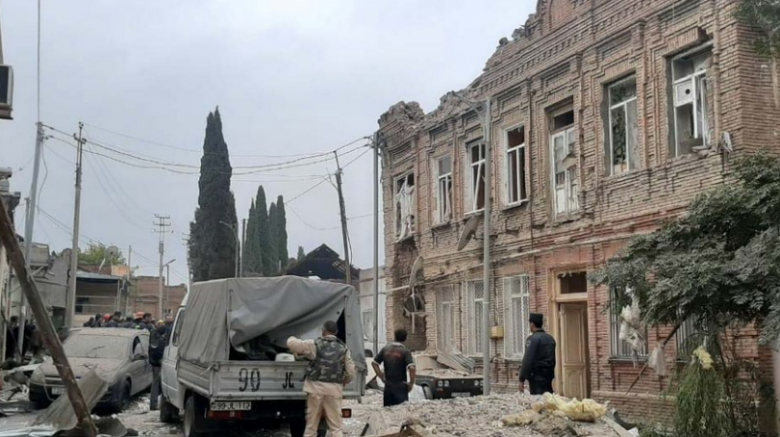Azerbaijani diaspora organizations operating in foreign countries issued a statement on the second anniversary of the bombing of Ganja, Barda, Tartar, Naftalan and other Azerbaijani cities on September 27-November 10, 2020.
According to APA, the statement was addressed to the heads of state and government of various countries, members of parliament, international organizations and their local representatives.
The statement reads: "We, Azerbaijanis living in foreign countries, honor the memory of those who died as a result of the bombing of Azerbaijani cities by the Armenian armed forces on September 27-November 10, 2020, condemn the crimes against humanity and peace, and those who committed these bloody crimes are still being held accountable. We regret that it was not.
We would like to note that Armenia's territorial claims and military aggression against Azerbaijan, which began in 1988, culminated in the First Karabakh War that took place in 1992-1994.
As a result, nearly 1 million peaceful Azerbaijanis were forced to leave their homes by expelling 250,000 people from the territory of Armenia, tens of thousands of Azerbaijanis were killed, the Khojaly genocide, one of the bloodiest crimes of the 20th century, was committed, hundreds of cities, towns and villages of Azerbaijan were wiped out, and the occupied territories were polluted with mines. .
Unfortunately, major powers and international organizations did not put serious pressure on Armenia to stop the occupation of Azerbaijani lands.
Although the Republic of Azerbaijan adhered to the peace process and the ceasefire agreement for nearly 30 years and tried to settle the conflict peacefully, Armenia refused to implement UN resolutions 822, 853, 874 and 884 on the immediate evacuation of the occupied Azerbaijani territories.
The occupation of Azerbaijani lands was ended by the Second Karabakh War, which started on September 27, 2020 and lasted for 44 days, in response to Armenia's provocations on the contact line.
The state of Azerbaijan fulfilled the UN resolutions by military and political means and liberated the occupied territories.
During the war, the Armenian armed forces grossly violated the norms and principles of international law, the requirements of the Geneva Conventions of 1949 and their Additional Protocols, and Naftalan, Barda, Tartar, Mingachevir, which are tens of kilometers away from the conflict zone and the front line, including the second largest city of Azerbaijan, Ganja. and Yevlakh cities, civil infrastructure objects in Goranboy, Agjabadi, Beylagan, Gabala, Absheron and Khizi districts - residential houses, hospitals, medical centers,
targeted school buildings, kindergartens, administrative buildings of state institutions, agricultural areas, and committed war crimes against humanity by firing with various types of weapons, including heavy artillery, ballistic missiles, phosphorus and cluster bombs.
As a result, from September 27 to November 10, 2020, as a result of the military aggression of Armenia, 93 civilians, including 12 children and 27 women, were killed, 454 citizens were injured, residential buildings, historical, cultural and religious monuments, vehicles and civil infrastructure were damaged. objects were heavily damaged.
Since the main goal of the Armenian armed forces in organizing these attacks was to end the lives of more people, the parts of cities and regions where civilians live compactly were targeted, especially at night.
Unfortunately, despite repeated appeals to the world community and international organizations regarding the identification and punishment of persons guilty of crimes against the civilian population by Armenia during the Second Karabakh War, Armenia's military and political forces have participated in numerous war crimes in gross violation of international humanitarian law norms. the actions against peace and humanity of the leadership have not yet been given an international legal assessment.
Despite the fact that two years have passed since the commission of these crimes, international organizations have not taken any steps to investigate the mentioned facts.
The Azerbaijanis of the world once again bring these facts to the attention of the UN, the European Union, the Council of Europe and their institutions, and other competent international and regional organizations, and firmly declare that in order to prevent Armenia from committing such criminal acts again, the international community must respond adequately to war crimes, those crimes perpetrators should be held accountable.
We call for immediate legal measures to bring to justice those responsible for crimes against peace and humanity committed on ethnic grounds at various times."
It should be noted that, as during the Second Karabakh War, Azerbaijan's diaspora organizations also supported the government of various countries regarding the provocations and war crimes of Armenia, including the non-delivery of mine maps, the provocations of September 12-14, 2022, and the discovery of mass graves in Edilli, as well as during the post-war period. and issued statements addressed to heads of government, members of parliament, international organizations and their local representatives, and expressed that they expect greater legal and political assessment of the provocations and war crimes of Armenia.
